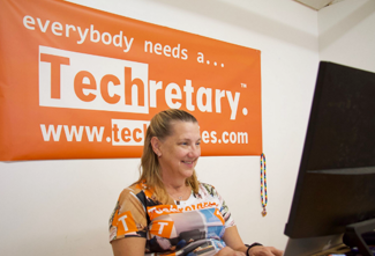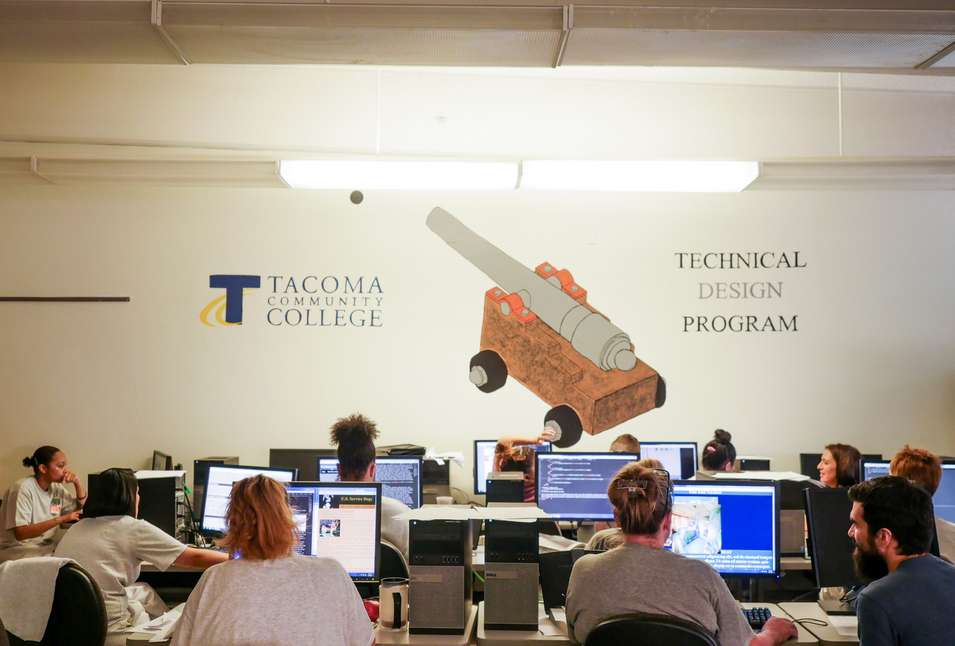Nonprofit Tech Startup Validates Model with Goal of Replicating Coding Program at More Correctional Facilities
March 07, 2019
By Mai P. Tran, ECMC Foundation
Three years ago, Yvonne Wood had barely heard of the Internet or held a smartphone. Today, the self-proclaimed “tech-geek” and web developer knows the ins and outs of coding.
Yvonne, who is almost 60 years old, spent the last three decades of her life at the Washington Corrections Center for Women (WCCW) where access to the Internet and most technology aren’t available to incarcerated individuals. She entered the correctional facility in the 1980s when the Internet had not yet become widespread and available for public use.

Yvonne Wood at her internship at Techretary.
During her years at WCCW, she had often thought about life after release and whether she would find her purpose and calling. Yvonne finally got her answer in 2016 when nonprofit tech startup, Unloop, held an introductory session about their software development training program, Unloop Academy.
Designed as a one-year cohort and career pathway model, the Unloop Academy program culminates in a web application developer certificate, which prepares participants to launch entry-level web development careers. Participants who want to continue their education have the option of transferring credits to computer science programs at two- and four-year institutions. In addition to WCCW, the program also operates within the Monroe Correctional Complex, a prison for men.
A Committed Partnership from the Postsecondary Education and Employer Community
Part of what makes Unloop’s work possible is the committed partnership of the postsecondary education community. Classes are taught by instructors from Tacoma Community College and Edmonds Community College. The campuses also provide equipment and offer academic credit for each course in the certificate program. Because Internet access isn’t allowed inside the facilities, an isolated server is used to simulate the look, feel and function of a real website.

Yvonne remarked how the instructors were not only resourceful but patient.
“One of our first assignments was to build a website, but I didn’t even know what a website was,” she says. “My teacher took the time to explain. He was patient, despite my tears and frustration, and helped me understand the tech world.”
Unloop also partners with employers who help inform the curriculum and ensure that the certificate program is industry-informed. Workshops with employers like Microsoft and Moz provide opportunities for participants to hear directly from companies about careers in the tech industry. Other available supports for participants include career counseling, mentorship opportunities and reentry services.
Since the program’s launch, Unloop Academy has been offered to six cohorts. To date, among the individuals who have been released, approximately half have transferred their credits and are enrolled in a postsecondary program, while others are in IT-related jobs.
Yvonne is one of the many success stories. With Unloop’s help, she landed an internship at Techretaries, a tech support and solutions company in Washington state, which eventually turned into a full-time position.
“While most people my age are looking forward to retirement within five to 10 years, I’m looking forward to just getting started,” she says. “It’s a chance for me to do something meaningful. My goal is to build a career at Techretaries—but it wouldn’t have been possible without Unloop.”
Collecting Data, Validating, Scaling
Unloop co-founder Lindsey Wilson says collecting data on outcomes like persistence, graduation, and job placement helps the team learn what is and is not working, and whether they should pivot and adjust the model.
As a result of this process, the model has been modified several times. For example, when the Unloop team saw a low persistence rate among students in the program’s inaugural year, they investigated the issue and discovered it was because many participants had lost interest and/or were initially unaware of the rigors of the program.
In response, the team added a mandatory, pre-requisite course to help participants gauge their interest before fully-immersing in the program. The new aspect of the program worked well and persistence rates increased from 65% to 95%.
In 2018, ECMC Foundation granted $769,010 to Unloop to help them further test and validate their pathway model in Washington state and support its scaling across the country. Part of that work will include creating a playbook that provides guidance on how to implement a web development program in other facilities.
Unloop’s co-founder acknowledges the road ahead is long, but that the team is eager to scale the program to any prison with a local tech community. Moreover, Lindsey hopes Unloop will help transform the tech industry to one that is open to hiring individuals, regardless of their past.
